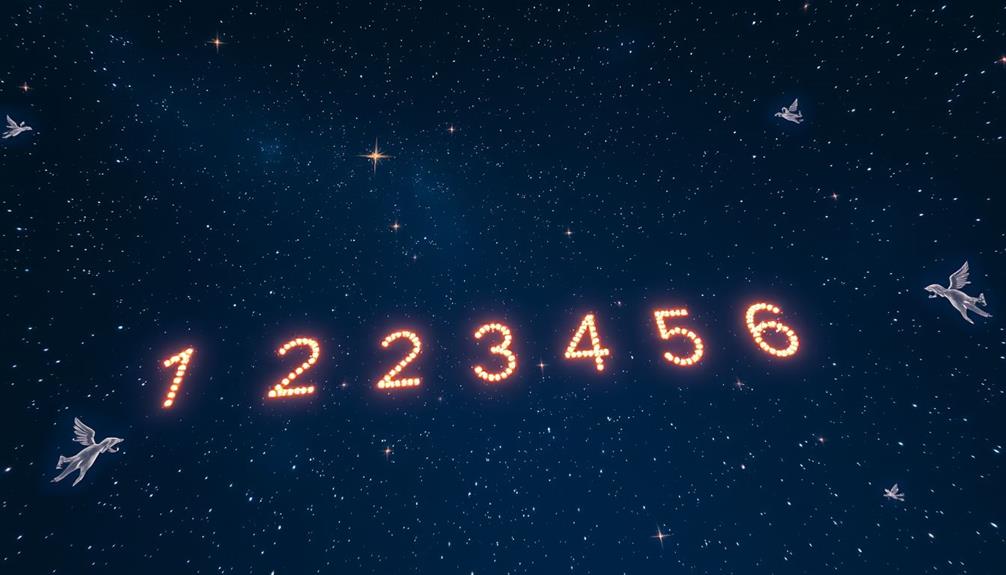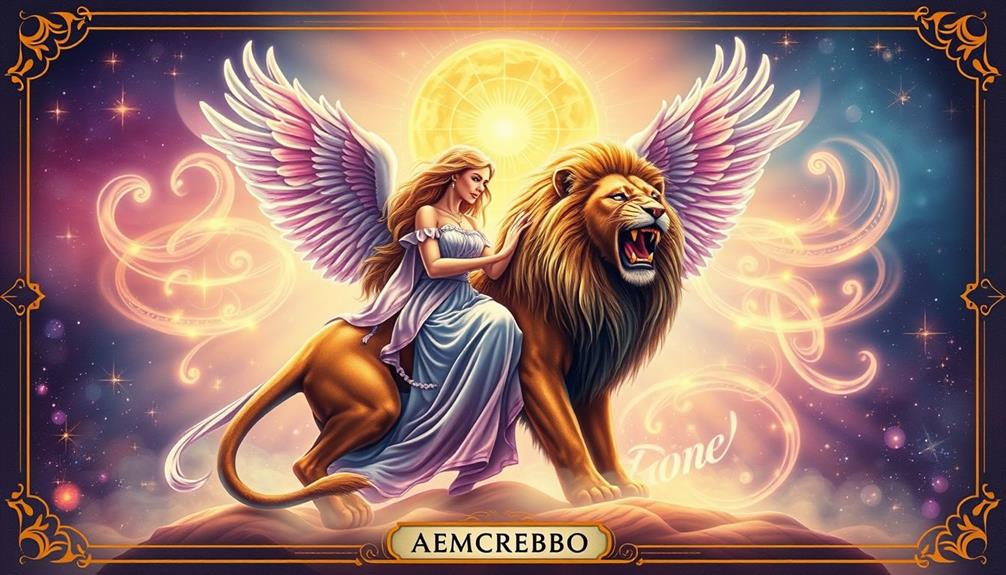Angel numbers come from a rich tapestry of ancient numerological practices and spiritual beliefs found across various cultures. Their origins trace back to civilizations like the Sumerians and Egyptians, who recognized numbers as carriers of spiritual messages. Pythagoras contributed to this by linking numbers to vibrational energies, influencing modern interpretations. In the early 2000s, Doreen Virtue popularized angel numbers within New Age spirituality, blending them with personal growth and guidance. While engaging with angel numbers can be insightful, it's important to reflect on their place in your spiritual journey. You'll find even more fascinating insights as you explore further.
Key Takeaways
- Angel numbers are not tied to a specific religion but are rooted in spiritual and mystical interpretations, especially within New Age practices.
- Their origins trace back to ancient civilizations like the Sumerians and Egyptians, who recognized numbers as carriers of spiritual messages.
- Pythagorean teachings linked numbers to vibrational energies and spiritual truths, influencing modern interpretations of angel numbers.
- L. Dow Balliett and Doreen Virtue expanded the concept of angel numbers in the 19th and early 21st centuries, respectively.
- While popular in New Age spirituality, belief in angel numbers may conflict with traditional religious teachings emphasizing direct divine guidance through prayer and scripture.
Definition of Angel Numbers
Angel numbers are fascinating sequences of repeated or patterned digits, like 111 or 1234, that many believe carry unique spiritual messages. These numbers are thought to offer you divine guidance and insights into your life, helping you navigate through various situations.
The concept of angel numbers gained traction in the early 2000s, largely due to the work of Doreen Virtue, who interpreted their spiritual meanings and made them accessible to a broader audience.
In the domain of numerology, each angel number is linked to specific interpretations that often focus on personal growth and spiritual awareness. For instance, seeing 111 might prompt you to pay attention to your thoughts, while 1234 might encourage you to take steps toward your goals.
The mystical significance of these numbers can be traced back to ancient Greece and other cultures, where numbers held spiritual and mystical importance.
While angel numbers aren't tied to any single religion, they reflect New Age practices that emphasize spirituality and self-discovery. As you explore these sequences, you'll find they can serve as tools for enhancing your spiritual journey and understanding your place in the universe.
Historical Roots and Traditions

When you explore the historical roots of angel numbers, you'll find their origins in ancient civilizations like the Sumerians and Egyptians, who believed numbers carried spiritual messages. The Sumerians used numbers to represent their gods and believed that specific number sequences were a way for these deities to communicate with humans. Similarly, the Egyptians associated certain numbers with divine beings and used them in their religious practices. The historical origins of angel numbers are deeply connected to these early beliefs in the spiritual significance of numbers, and this concept has persisted through various cultures and belief systems over time. The concept of angel numbers also has ties to Christianity, where numbers are often seen as symbols of divine communication and guidance. In the Bible, specific numbers are often associated with spiritual meanings and are believed to carry messages from God. This connection between angel numbers and Christianity has further solidified the belief in the spiritual significance of certain number sequences, and it continues to be a prevalent belief in many religious and spiritual practices today.
Pythagoras played an essential role by linking numbers to vibrational energies, shaping how we comprehend personal growth through numerology today.
Over time, mystical interpretations evolved, leading to the modern concept of angel numbers that many embrace now.
Ancient Numerological Practices
Numerology's roots run deep, stretching back to ancient civilizations that recognized the significance of numbers in their lives. The Sumerians, around 4000 BC, first embraced ancient numerology, using counting systems for trade and astronomy.
Meanwhile, the Egyptians developed a sophisticated numerical system, employing symbols for various mathematical concepts and measurements.
Pythagoras, the Greek philosopher from the 6th century BCE, is often regarded as the father of numerology. He proposed that numbers possess inherent spiritual significance and vibrational energies, which can guide individuals on their paths.
Other cultures, including the Babylonians and Hebrews, engaged in mystical practices involving numbers, believing they held divine messages and insights into the universe.
As ancient numerology evolved, it laid the groundwork for modern interpretations. In the 19th century, L. Dow Balliett expanded upon Pythagorean ideas, linking numbers to personal qualities and spiritual guidance.
This connection helped shape the way you view angel numbers today, as they serve as reminders of the spiritual significance numbers carry in your life. Understanding these ancient practices can deepen your appreciation of the messages these numbers bring.
Pythagorean Influence on Spirituality
The profound connection between numbers and spirituality, as articulated by Pythagoras, continues to resonate in contemporary practices. As the Father of Numerology in the sixth century BC, Pythagoras proposed that numbers possess unique vibrational energies that shape human life and the universe. He believed these numbers could reveal spiritual truths, emphasizing that the universe operates through numerical relationships.
Pythagorean numerology lays the groundwork for understanding the spiritual significance of numbers, influencing modern interpretations of angel numbers. Specific numbers, like 1 for unity and 3 for completeness, hold particular meanings that guide your spiritual journey. These concepts laid a foundation for later mystical interpretations across cultures, linking numbers to deeper spiritual insights.
In the 19th century, L. Dow Balliett expanded upon Pythagorean ideas, connecting numbers to colors, music, and personal vibrations. This progression helped shape how we view numerology today, enhancing our appreciation for the profound meanings embedded in angel numbers.
Evolution of Mystical Interpretations
Throughout history, mystical interpretations of numbers have evolved, blending ancient practices with contemporary beliefs. The concept of angel numbers traces back to early civilizations, like the Babylonians, Egyptians, and Greeks, who attributed spiritual significance to numerical values.
Pythagoras, known as the Father of Numerology, pioneered the idea that numbers carry unique vibrations influencing personal life paths and character. This concept laid the groundwork for how we comprehend angel numbers today.
As time progressed, mystical number systems adapted, particularly through the work of L. Dow Balliett in the 19th century. She expanded on Pythagorean principles, connecting numbers to personal qualities based on the vibrations from names and birth dates.
Fast forward to the early 2000s, Doreen Virtue popularized the term "angel numbers," highlighting their role as divine messages within New Age spiritual practices.
Cultural beliefs have considerably shaped historical interpretations of numbers, leading to the wide acceptance of angel numbers as a form of spiritual guidance in modern society.
Despite their absence from traditional religious texts, these interpretations resonate with many who seek deeper connections to the universe and its vibrations.
Spiritual and Esoteric Influences

Emerging in the ancient practices of Pythagorean numerology, the concept of angel numbers reveals how numbers carry unique vibrational energies that can shape your life path and spiritual journey.
L. Dow Balliett expanded these ideas in the 19th century, connecting numbers to colors and vibrations that promote personal growth. This laid the groundwork for modern esoteric practices surrounding angel numbers.
In the early 2000s, Doreen Virtue popularized the term "angel numbers," emphasizing their role in providing spiritual guidance and fostering personal awareness.
Despite her later distancing from the concept, her influence remains significant. Today, numerous authors and spiritual practitioners continue to explore angel numbers, aligning them with the New Age beliefs that encourage seeking spiritual insight beyond traditional frameworks.
As you interpret numerical sequences in your life, you may find messages from the spiritual universe that resonate with your experiences.
This ongoing interest reflects a cultural shift towards esoteric practices like astrology and tarot, further enriching your understanding of angel numbers.
Psychological Perspectives on Synchronicity

As you explore the domain of angel numbers, you might find that your experiences resonate with the concept of synchronicity, introduced by Carl Jung. He described synchronicity as meaningful coincidences that link your psychological state with external events. This concept suggests that your inner world influences how you perceive the significance of angel numbers.
Jung proposed that synchronicity emerges from the collective unconscious, where shared archetypes shape your personal experiences. This connection allows you to see deeper significance in the patterns you encounter, enhancing your understanding of those numbers in your life.
Here's a quick overview of how synchronicity relates to angel numbers:
| Concept | Description | Significance |
|---|---|---|
| Meaningful Coincidences | Events that seem connected despite lacking causal links | Reflects your inner thoughts |
| Collective Unconscious | Shared archetypes influencing experiences | Links personal insights to universal patterns |
| Psychological State | Your mental and emotional condition | Affects how you perceive angel numbers |
| Spiritual Dimensions | The connection between the psychological and spiritual | Emphasizes the depth of meaning in experiences |
Recognizing synchronicity can deepen your appreciation of angel numbers as you navigate your spiritual journey.
Modern Interpretations and Practices

In recent years, modern interpretations of angel numbers have gained significant traction, largely fueled by the New Age movement's focus on personal spiritual growth. Doreen Virtue played an essential role in popularizing angel numbers in the early 2000s, providing detailed meanings for sequences from 000 to 999. This framework offers you spiritual guidance, helping you interpret the divine messages hidden in these numerical patterns.
With the rise of online platforms, you now have access to a wealth of resources, including forums and social media groups where individuals share personal experiences and insights about angel numbers. This communal approach enriches your understanding and encourages a deeper exploration of the significance of these numbers.
Contemporary practitioners often blend elements from various spiritual traditions, incorporating numerology, astrology, and intuitive insights. This holistic understanding allows you to see angel numbers as more than mere coincidences; they become tools for reflection and growth.
Risks and Alternatives for Guidance

While exploring angel numbers can be intriguing and provide a sense of community, it's important to recognize the potential risks involved. Belief in angel numbers often conflicts with traditional religion and biblical teachings. Instead of fostering a solid faith foundation, these spiritual practices might lead you away from a direct relationship with God.
The Bible emphasizes seeking guidance through prayer and scripture, not through numerological beliefs. Engaging with angel numbers can mislead you, detracting from the truth found in Christian doctrine. This reliance can create uncertainty in your spiritual journey, steering you away from the core message of the Gospel and the support of your faith community.
Consider focusing on alternatives that strengthen your connection with God. Studying the Bible and relying on the Holy Spirit for guidance can provide a more reliable path for spiritual growth.
Community support from fellow believers offers encouragement and accountability, helping you stay rooted in biblical teachings. By prioritizing these practices, you can avoid the risks associated with angel numbers and nurture a deeper, more fulfilling faith experience.
Frequently Asked Questions
Where Did the Angel Number Originate?
Angel numbers originated from ancient numerology, where civilizations like the Sumerians and Egyptians assigned spiritual meanings to numbers. This concept evolved, influenced by Pythagoras and later popularized in the early 2000s by Doreen Virtue. The history of angel numbers has been shaped by various cultural and spiritual traditions, each adding their own interpretations and significance to different combinations of numbers. In modern times, the concept of angel numbers has gained popularity in New Age and spiritual circles, with many people using them as a way to connect with their intuition and higher consciousness. The rich history of angel numbers continues to evolve as more people explore their meaning and significance in the context of their personal spiritual journey.
What Culture Believes in Angel Numbers?
Picture a wise owl in a tree, symbolizing ancient knowledge. Many cultures, from Babylonian to modern New Age, embrace angel numbers, believing they offer spiritual guidance and insight, helping you navigate life's mysteries.
What Religion Do Angels Come From?
Angels originate from various religious traditions, including Christianity, Judaism, and Islam. You'll find their roles as divine messengers and protectors throughout sacred texts, emphasizing their importance across cultures and spiritual beliefs.
What Are Angel Numbers Based Off?
Angel numbers are based on Pythagorean numerology, connecting numbers to unique energies that influence your life path. They draw from ancient mystical practices and modern New Age beliefs, offering spiritual guidance through numerical messages.
Conclusion
In exploring the origins of angel numbers, you'll discover a rich tapestry of spiritual traditions, psychological insights, and modern interpretations. Just as a compass guides a lost traveler, these numbers can offer direction and clarity in your life. However, it's crucial to approach them with discernment, balancing intuition with critical thinking. Ultimately, whether you see them as divine messages or mere coincidences, they can serve as a tool for self-reflection and personal growth.










